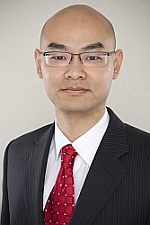Professors from China met with New Jersey State Bar Association (NJSBA) staff and members from APALA-NJ recently to discuss efforts to preserve judicial independence and promote fairness and access to the justice system.
Sharon Balsamo, NJSBA assistant executive director and general counsel, welcomed the group of about 25 professors from the Henan Academy of Governance and explained how the NJSBA educates its members and the public, works with government on issues of concern, and gives NJSBA members a forum to have a voice on issues—all efforts to promote access to justice.
Lisa Spiegel, senior managing director of continuing legal education programs, explained that the NJSBA provides education to all areas of the New Jersey court system, from the state Supreme Court down to the municipal courts. And Director of Government Affairs Lisa Chapland discussed how the NJSBA advocates for positions of legislative interest to the association and presented an overview of the Legislature and how laws are made.
Members of the Chinese group asked numerous questions, including the size and population of New Jersey, how attorneys are licensed, the number of bills introduced annually in the Legislature and details about how matters such as manslaughter are handled in the courts.
APALA-NJ member Moly Hung offered insights based on his experience as a municipal court judge. “The caseload for municipal court depends on the population and in a town of 80,000 people, a judge can hear 250-300 cases in one session,” he said. “Cases move very quickly and you have to make quick decisions. If someone wants a trial, you do it then and there, unless you move it.”
The meeting was arranged through the U.S.-China Business Training Center. Based in California, the center is a China State Administration of Foreign Affairs-certified provider of professional training programs for Chinese officials, industry professionals and business executives. APALA-NJ members and Hill Wallack attorneys, Henry Chou and Kun Zhao, attended the event.

.png) English
English 简体中文
简体中文 
